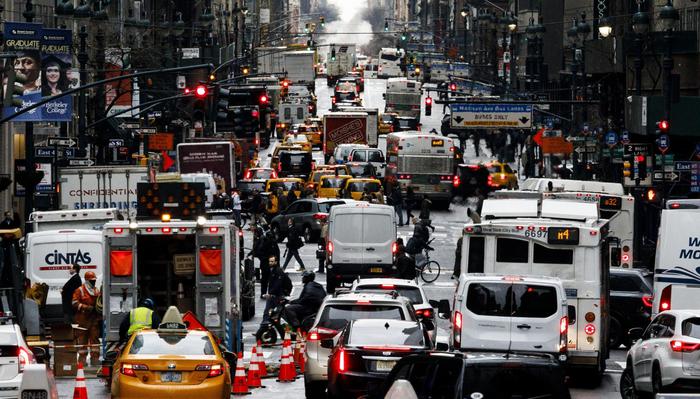The reintroduction of congestion pricing tolls in New York City will be on the agenda at today’s MTA board meeting.
Governor Kathy Hochul revealed last week her plan to implement congestion pricing starting in January 2025, though she proposes reducing the toll for entering Manhattan below 60th Street from $15 to $9.
The MTA will hold a joint committee meeting at 9 a.m., followed by the regular board meeting at 11 a.m. The meeting will be livestreamed on the MTA’s website.
The public is welcome to provide comments, either virtually or in person, with each speaker allowed up to two minutes. To comment, individuals must register either online or on-site. Online registration for the committee meeting will be open from 8:25 to 8:55 a.m., and for the board meeting from 10:25 to 10:55 a.m.
The Metropolitan Transportation Authority (MTA) also revealed plans to gradually increase Manhattan’s congestion pricing tolls, reaching $15 by 2031, according to Gothamist. Documents released by the MTA outline the toll structure, including a $12 base fee for passenger vehicles starting in 2028.
While Hochul’s office previously acknowledged that toll prices would rise eventually, the timeline was not clearly defined. Kathryn Garcia, Director of State Operations, clarified last week that the Governor intends to hold the toll at $9 for at least the next three years, after which the MTA will implement a phased increase toward the $15 toll.
At a press conference unveiling the new congestion pricing plan, Garcia emphasized that the MTA’s timeline and gradual toll hikes are aligned with necessary infrastructure funding. “The MTA will file a proposal for the phase-in plan, which will ultimately reach $15,” she said.
The MTA further explained the phase-in details on Friday, publishing a resolution set for approval by the agency’s board on Monday. This resolution solidifies the $9 toll launch date of January 5, 2024, and outlines the steps for future increases.
According to the MTA, the increased tolls are crucial to generating the $15 billion needed for MTA repairs and upgrades, a requirement under state law. The implementation of congestion pricing, which had been stalled for several months, aims to address both the agency’s funding needs and the city’s traffic congestion.
Governor Hochul had previously paused the toll program in the summer, delaying the planned $15 toll due to concerns about its impact on drivers. The MTA initially intended to launch the program in June, but the Governor delayed the start date, citing the toll’s potential burden on motorists.
The push for congestion pricing gained renewed momentum after the 2024 presidential election, when Republicans won control of both the White House and Congress. President-elect Donald Trump, who had criticized the tolling plan, had pledged to stop the Manhattan fees, with the MTA’s toll implementation set just weeks before his inauguration.
Danny Pearlstein, a spokesperson for the transit advocacy group Riders Alliance, acknowledged that any increase in the toll would likely upset drivers, regardless of the amount. “Even a slight increase would have stirred controversy,” Pearlstein remarked. “However, this plan represents a compromise, and while it will generate less revenue upfront, it’s a lighter touch on the public than previous proposals. The MTA will still face challenges in getting drivers off the roads, but this is a step in the right direction.”












